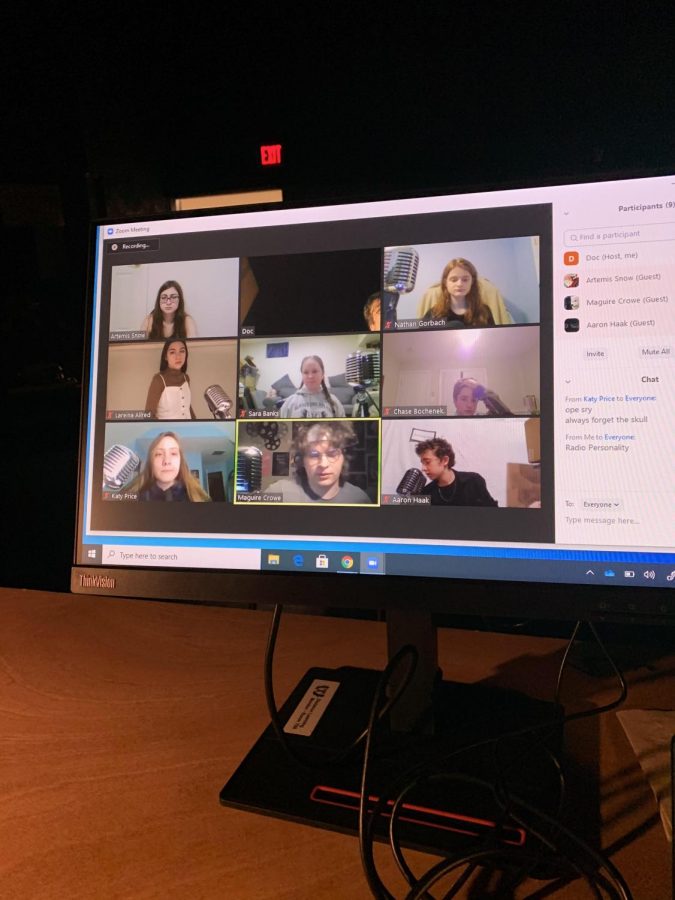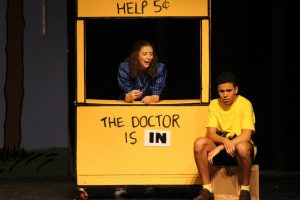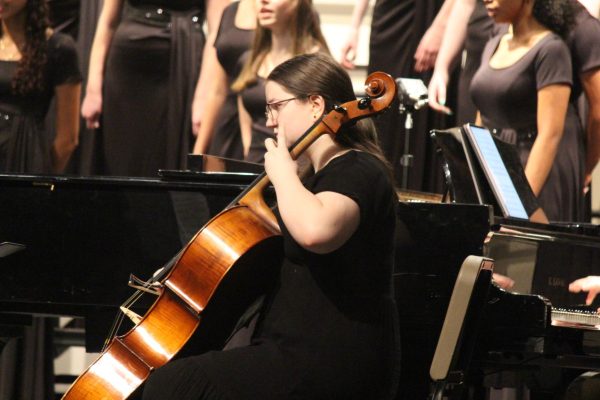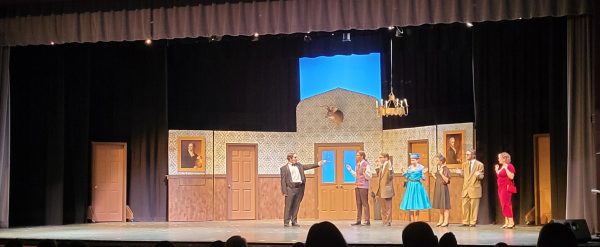Coming to a Screen Near You: The Twisted Tales of Poe
Be sure to check out The Twisted Tales of Poe, livestreaming January 28-30.
Despite the challenges they’ve faced this year, the Theatre Program will be turning out yet another show in the form of their newest radio play, “The Twisted Tales of Poe.” Based on the works of famous American author and poet Edgar Allan Poe, the play will open on January 28th and run through the 30th, live-streamed at 7:30 each night.
What exactly is a radio play? In this case, the decision was made to reinvent a 1940s version of Poe’s short stories in their own era’s popular genre: the radio show. This means that each actor has the opportunity to portray radio celebrities of time, who are then given multiple roles throughout the four intertwined stories of said radio show.
For example, famous characters of his such as the Caretaker of the “Tell-Tale Heart” (played by junior Lareina Allred) or Inspector Talbot of “The Spectacles” (played by freshman Chase Bochenek) are introduced in their proper stories and consequently appear in those to follow, making the original plots become even more twisted—hence the title of the play. “All these famous stories that you’ve already heard of, but they change them and they kind of fit them all together in this one narrative,” Allred explained .
By presenting this type of play, each cast member was given an opportunity to try out different accents and characterization methods to vary the identity of each role they play. “With a radio play, you don’t necessarily have to look like what you sound like. And so we get to play with different characters and physicality… you may be seeing one thing… but what you hear is the actual story,” Allred enthused. In fact, the director, Doc Worth, specifically hand-picked this piece for that purpose.
Her decision, she said, was motivated by how she loved “the idea of making a foley board work and having the actors do voice work playing multiple characters.”
The appeal of a radio play is furthered by what Doc referred to above as the use of a “foley board”: a creative way of implementing sound effects live through the use of ordinary objects. In this play, for instance, cast members will be simultaneously tasked with certain sound effects—a bongo drum to create the illusion of heartbeat, or a pair of shoes “walked” across a hard surface to insinuate footsteps.
The quarantine forced them to get creative in this aspect: “The largest obstacle has been finding ways to do the foley board sound effects via the computer—we had to purchase computer microphones and materials to make the sounds such as cobble stones, bricks, [and] wind machines,” Doc detailed.
Even more so, everyone in the theater program has been forced to adapt in this new, vastly different environment of acting through a screen. For freshman cast member Chase Bochenek, his first Dominion theatre experiences have been “a little weird at first to say the least, but after the first play I think we got most of the kinks worked out.”
This time around, they’ll be much more experienced with “[their] own setup—with [their] own props, and [their] own costumes and microphones in [their] own houses,” as Allred explained of the adopted at-home system for this play.
After their first experience, diving in with very few clues as to how that would work, many of them have found necessary changes to be made in their performances prompted from switching online. Whether it’s the pressure that the audience can see each actor up close and personal or missing the way a live audience’s reactions made them feel, this has been a hard transition for everyone.
The change to a small screen as opposed to the large stage, for example, Doc must consider every minute detail, image, physicality, and sound-wise. Just a fraction of these include “the background, how the costumes look on camera, how the actors facial expressions play on camera, and how to show the foley board sound effects while also being heard clearly,” she explained.
Similarly, in Allred’s mind, the absence of a live audience has changed her acting methodology and mindset altogether. “You have to adapt the way that you think about yourself and your space, because when you’re on stage, you can kind of get away with stuff because people physically aren’t close to you… when you’re on a screen, people can zoom in, they can see your face,” she said.
In fact, to maintain the sentiments and importance of theatre in its true form, “The show will be live streamed in an effort to keep live theatre alive at Dominion,” Doc clarified.
Ultimately, this show truly embodies the nature of the difficult times through which the world is living: a twisted, combined version of the normalcy it used to enjoy just like timeless short stories of Poe’s that are being presented. However, as everyone involved in the theatre program has worked past these inhibitions to put on a show for the Dominion community, the best thing to do as a show of thanks would be to watch the show and enjoy what they’ve been working so hard to bring to life.

Neena Peterson, the Co-Editor-in-Chief, is a four year reporter for DHS Press, first writing for the newspaper in 2018. They prefer to focus on pieces...












